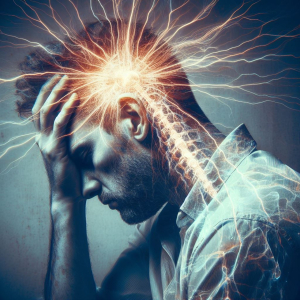Migrane Headache
A migraine is a neurological condition characterized by intense, often debilitating headaches. Migraines are typically recurrent and can vary in intensity and duration. They are often accompanied by other symptoms such as nausea, vomiting, and sensitivity to light and sound. Migraines can significantly impact a person’s quality of life, affecting their ability to function normally.
Symptoms of Migraine:
- Headache Pain: Usually intense, throbbing, or pulsating pain, typically on one side of the head, but can occur on both sides.
- Aura: In some cases, migraines are preceded or accompanied by sensory disturbances called auras. Auras can include visual changes (flashing lights, blind spots), tingling sensations, or speech disturbances.
- Sensitivity: Increased sensitivity to light (photophobia), sound (phonophobia), and sometimes smells (osmophobia).
- Nausea and Vomiting: Many people experience nausea and may vomit during a migraine attack.
- Fatigue and Irritability: Fatigue and mood changes may occur before, during, or after a migraine.
- Blurred Vision: Vision may become blurry during a migraine attack.
Phases of a Migraine Attack:
- Prodrome: Early warning symptoms that occur hours or days before a migraine. These may include mood changes, food cravings, neck stiffness, and frequent yawning.
- Aura: If present, auras occur just before or during the headache phase and involve reversible visual, sensory, or speech disturbances.
- Headache: The main phase, characterized by throbbing pain, typically on one side of the head, along with other symptoms like nausea and sensitivity to light and sound.
- Postdrome: After the headache, individuals may feel drained, confused, or elated for up to a day.
Causes and Triggers: The exact cause of migraines is not fully understood, but they are believed to involve abnormal brain activity affecting nerve signals, chemicals, and blood vessels. Triggers can vary widely among individuals and may include:
- Hormonal Changes: Such as fluctuations in estrogen levels in women.
- Dietary Factors: Certain foods and drinks, including aged cheeses, alcohol, caffeine, and food additives.
- Stress: Emotional stress or anxiety.
- Sensory Stimuli: Bright lights, loud noises, or strong smells.
- Sleep Changes: Lack of sleep or changes in sleep patterns.
- Physical Exertion: Intense physical activity.
- Weather Changes: Changes in weather or barometric pressure.
Therapies and Treatments for Migraines:
- Medications:
- Pain Relievers: Over-the-counter medications like ibuprofen or acetaminophen. For severe migraines, prescription drugs such as triptans (sumatriptan, rizatriptan) or ergotamines may be used.
- Preventive Medications: For frequent migraines, preventive treatments may include beta-blockers, anticonvulsants, antidepressants, and calcium channel blockers.
- CGRP Inhibitors: Newer medications that target the calcitonin gene-related peptide (CGRP) pathway, involved in migraine development.
- Lifestyle Changes:
- Avoiding Triggers: Identifying and avoiding personal migraine triggers.
- Regular Sleep and Eating Patterns: Maintaining consistent sleep schedules and regular meals.
- Stress Management: Techniques such as relaxation exercises, meditation, and biofeedback.
- Alternative Therapies:
- Acupuncture: May provide relief for some individuals.
- Biofeedback and Cognitive Behavioral Therapy (CBT): Can help manage migraine triggers and symptoms.
- Supplements: Some evidence supports the use of magnesium, riboflavin (vitamin B2), and coenzyme Q10 for migraine prevention.
Important Considerations:
- Diagnosis: Accurate diagnosis is crucial and typically involves a clinical evaluation, patient history, and, in some cases, imaging studies to rule out other conditions.
- Impact on Quality of Life: Migraines can significantly affect daily life, including work, school, and social activities.
- Individualized Treatment: Treatment plans should be tailored to the individual’s symptoms, frequency of attacks, and response to medications.
Current Research and Developments: Ongoing research into migraines focuses on understanding their underlying mechanisms, identifying genetic and environmental factors, and developing new and more effective treatments. Advances in neuromodulation techniques and personalized medicine are also areas of active investigation.

SANJEEVANI WELLNESS HOME
A sanctuary of holistic healing and rejuvenation, offering personalized wellness programs, expert care, and a serene environment to restore balance and vitality.
#1044, 59th C Cross Rd, beside golden heights mall, 4th M Block, Rajajinagar, Bengaluru, Karnataka 560010.
Important Links
Office Hours
Monday – Sunday
8:00 am – 8:00 pm

